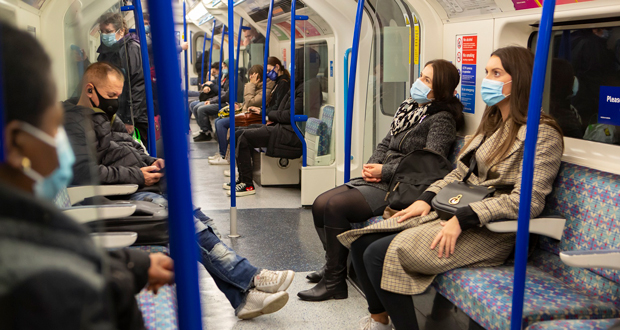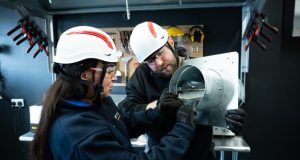A new study reveals 47 per cent of UK-based adults have concerns surrounding germs on public transport. One in five say they’re still wearing masks on buses, trains and other forms of public transport, while a third are still sanitising their hands.
Research conducted by commercial cleaning service provider, Perfect Clean, found that 14 per cent of people are “very concerned” about the impact germs and bacteria on public transport might have on their wellbeing, while 33 per cent report being conscious and “somewhat concerned”.
The survey findings conclude that almost half of the UK express a level of concern about public cleanliness on public transport.
Just 10 per cent of people across the UK use public transport every day, and a further 14 per cent said they use it once or twice a week. When using public transport, 18 per cent of all respondents said that they still wear masks – five per cent of which said that they did so “every time”.
A larger 35 per cent say that they still use hand sanitiser when using public transport, with a little over one in 10 (14 per cent) saying they do so “every time”.
A quarter of those still taking precautions say that their reason is due to continuing Covid concerns, while 36 per cent say that it is part of their everyday hygiene routine.
Those aged 60+ represent the largest percentage across all age groups taking precautions due to continued Covid concern, with 35 per cent admitting to it being their main reason for continuing to wear masks and sanitise on public transport.
Regionally, 22 per cent of those living in the North of England share the largest voice of concern over germs and how clean the transport is, versus those in Wales, where concern is as little as six per cent.
In addition to Perfect Clean’s survey, recent Government data shows that while public transport methods have seen a gradual increase in use over the course of 2022, these figures are still below the pre-Covid base level.
As of February 2023, use of rail services were only 73 per cent of the figures seen in the same week in 2019 – a reduction of 27 per cent. Buses outside of London have fared slightly better, with usage figures now at 81 per cent of their 2019 equivalent, while use of London buses is at a larger 85 per cent.
London’s tube service has fared slightly worse, sitting at just 74 per cent of its pre-Covid base level.
The introduction of remote and hybrid working models to post-Covid normality might offer some explanation as to the reduction in overall use of public transport, but 39 per cent of all respondents said that they viewed public transport as “too unreliable”, often making them late.
Regionally, 33 per cent of those in both the South and East of England report “terrible” service as one of their main complaints with public transport, while one in five (22 per cent) of those aged 25-39 feel uncomfortable travelling with strangers.
On the other hand, 31 per cent of all survey respondents said that public transport was the most convenient form of transport for them, while 24 per cent praised its cost efficiency. These numbers rise in London, where 56 per cent say it’s the most convenient method and 36 per cent say it’s the most cost effective. As might be expected, 39 per cent of Londoners say that public transport is the fastest way to travel the capital.
Commenting on these findings, Managing Director of Perfect Clean, Emilia Ferenc, stated: “As our research has shown, public transport remains a convenient and cost-effective mode of travel for much of the British public, used by many on a daily basis. With the global pandemic still lingering in people’s minds, it’s perhaps unsurprising that we have seen half of our respondents saying they’re concerned about cleanliness and hygiene on buses and trains, or continuing to take precautions such as wearing masks and using hand sanitiser. Companies such as ourselves are on-hand to provide fast, effective cleaning services for public transport and other commercial sites, but we would always advise the general public to take care of themselves and others, especially if they are unwell, in order to avoid the spreading of viruses and infections.”





